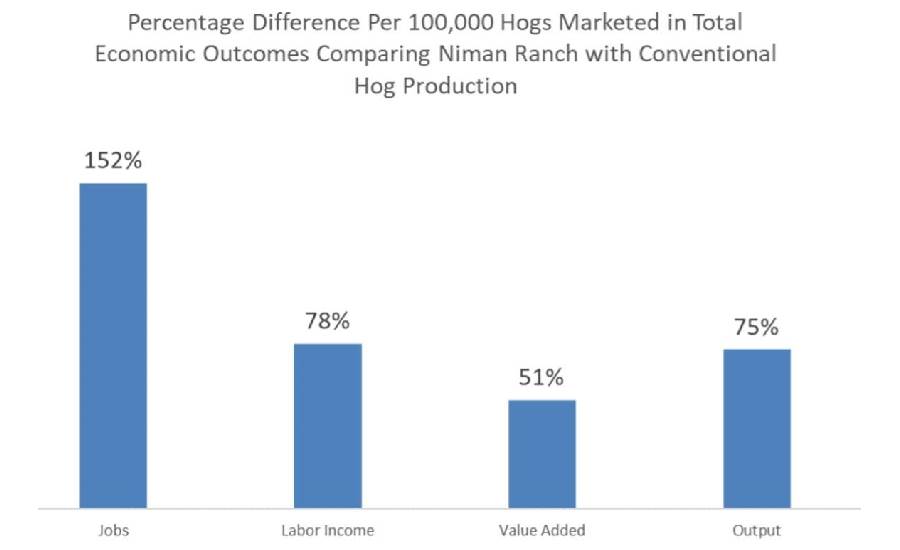Premier natural meat brand Niman Ranch generates more than 50% more economic value for the local economy than the conventional hog industry, per 100,000 hogs sold, a new economic impact analysis revealed. The analysis, conducted by respected regional economist Dave Swenson, also showed that Niman Ranch creates over 150% more jobs than conventional hog production and in 2019, the year studied, generated more than $20 million in added value for the local Iowa economy (the equivalent measurement of gross domestic product).
“Local economies would prosper if more adopted Niman Ranch’s approach instead of conventional production,” said Swenson of his findings. “This is the Main Street effect. The small farmers in Niman’s network hire more people, spend more regionally and their employees also spend their money closer to home.”
Swenson analyzed 2019 data on the overall Iowa hog industry contributions and compared it to Niman Ranch-specific inputs and outputs of their 195 Iowa-based farmers. The analysis utilized the IMPLAN, Inc., modeling system, the most widely used input-output modeling system in the U.S. The full methodology and findings can be viewed in the full analysis. Additional analysis findings include:
- Niman Ranch’s 195 Iowa-based farms created 339 jobs in the state in 2019.
- For every $1 million in direct sales, Niman Ranch farms produce 14 jobs and generate an additional $2.03 million in other economic inputs, including labor income and value-added spending.
- Iowa’s 195 Niman Ranch farms created nearly $50 million in total output (value of hogs) and over $20 million in added economic value for the local community.

Niman Ranch was founded by farmers and ranchers and its business model was developed to ensure producers are treated fairly and can make a living. Niman Ranch pays farmers a premium that is based on inputs, like feed, rather than commodity markets, providing a stable premium they can count on. The premium pay and security Niman Ranch offers allows farmers to reinvest in their businesses and local communities, creating an economic multiplier effect.
“This study proves that there is significant value in these smaller, diversified farms,” said Chris Oliviero, Niman Ranch General Manager. “We’re never going to feed the world, but the Niman Ranch business model brings real resources and opportunities into rural communities. We’re a small part of the food chain, but our farmers have an outsized positive impact.”
Dave Swenson presented the analysis findings on Saturday August 28, 2021 at Niman Ranch’s 23rd Annual Hog Farmer Appreciation Celebration. The annual event recognizes the contributions and hard work Niman Ranch hog farmers put into raising their livestock with care and their contributions to local communities. At the event, Niman Ranch awarded over $170,000 in scholarships to support the next generation of young farmers and rural leaders and also distributed numerous farmer awards recognizing sustainable farming practices, meat quality and anniversaries working with the brand.
19-year Niman Ranch farmer Ron Mardesen of Elliott, IA described the positive role small farms like his have in their communities. “Regional economies are built on local economies. Local economies are built around needs and people. Smaller independent family farmers need a place to buy gas, need a place to buy groceries, we need a place to buy feed, we need a veterinarian, we need a school for our children, we need a place to worship,” shared Mardesen. “The premium Niman Ranch pays me allows me to manage my farm in a positive productive way. Niman Ranch gives me the chance to plan for the future of the farm, instead of worrying about there being a future for the farm.”
Source: Niman Ranch




Report Abusive Comment